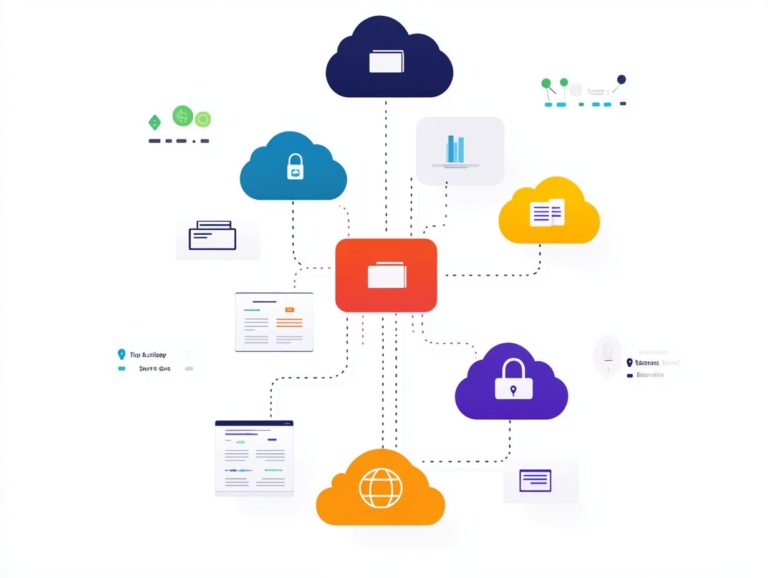5 Best Practices for Choosing a Cloud Provider
Choosing the right cloud provider is an important choice for your business as you seek to leverage the advantages of cloud computing. With many options available, understanding your specific needs and goals is just the starting point.
This article serves as your roadmap through essential best practices. From assessing a provider’s reputation and security protocols to ensuring scalability and responsive customer support, you ll find valuable insights to guide your decision.
Whether you re venturing into cloud services for the first time or contemplating a switch, these recommendations will help you make a smart choice quickly!
Contents
- Key Takeaways:
- 1. Determine Your Specific Needs and Goals
- 2. Research the Provider’s Reputation and Track Record
- 3. Evaluate Security Measures and Protocols
- 4. Consider Scalability and Flexibility
- 5. Look Into Customer Support and Service Level Agreements
- What Are the Key Factors to Consider When Choosing a Cloud Provider?
- What Are the Different Types of Cloud Services Offered?
- How Can a Business Determine Their Specific Cloud Needs?
- What Are the Common Security Concerns with Cloud Computing?
- How Can a Business Ensure Smooth Scalability with Their Cloud Provider?
- What Are the Signs of Good Customer Support from a Cloud Provider?
- Frequently Asked Questions
- Top 5 Tips for Choosing a Cloud Provider
- How Do I Assess My Needs When Choosing a Cloud Provider?
- Why Is It Important to Research a Cloud Provider’s Reputation?
- What Should I Look for When Evaluating a Cloud Provider’s Security Measures?
- How Can I Understand a Cloud Provider’s Pricing and Contract Terms?
- Why Is Customer Support and Service an Important Consideration When Choosing a Cloud Provider?
Key Takeaways:

- Define your needs and goals clearly before you start searching for cloud providers.
- Thoroughly research the reputation and track record of potential providers to ensure reliability and quality service.
- Prioritize security by evaluating the measures and protocols implemented by the provider.
1. Determine Your Specific Needs and Goals
Determining your specific needs and goals is essential in selecting the right cloud provider for your cloud computing journey. This foundation is vital for achieving your business’s health and sustainability objectives within a cloud transformation strategy.
To assess your unique requirements, start by identifying performance metrics, such as response times and uptime guarantees, crucial for maintaining operational efficiency.
Evaluating potential migration candidates those applications and data that can transition to the cloud without causing workflow disruptions is also important. Compliance should be at the forefront of your considerations; ensure your cloud solutions meet industry regulations.
If scalability is your goal, prioritize cloud offerings that can handle rapid growth. For those focusing on security, consider looking into 5 steps to evaluate cloud providers’ performance and seek providers that offer advanced encryption options.
It’s also important to consider data sovereignty, especially if you operate in multiple jurisdictions; ensure your data remains compliant with legal frameworks.
By aligning these diverse goals with potential cloud providers’ capabilities, you can pave the way for a smoother transition and support long-term success.
2. Research the Provider’s Reputation and Track Record
Researching a cloud provider’s reputation and track record is crucial for ensuring service that meets your performance and security needs. Additionally, understanding the 5 criteria for comparing cloud providers is a smart move to sidestep vendor lock-in traps, a situation where switching providers becomes difficult due to the unique tools or data formats used by your current provider.
Customer reviews provide invaluable insights into the experiences of current clients, allowing you to gauge satisfaction levels and service reliability. Glowing reviews are a reassuring sign!
Look for industry certifications such as ISO 27001; these are strong indicators of a provider’s dedication to high standards in security and data protection. Engaging with third-party assessments from respected organizations can further illuminate a provider’s capabilities.
These assessments reveal how effectively they ve navigated specific security incidents or compliance challenges. Taking the time to examine the provider’s history and analyze client case studies can highlight their experience in addressing various cloud computing needs, ultimately helping you make informed decisions that support your business objectives.
3. Evaluate Security Measures and Protocols
Evaluar las medidas y protocolos de seguridad de un proveedor de la nube es esencial para mitigar los riesgos asociados con la gesti n de datos y garantizar el cumplimiento de varios est ndares, como los defendidos por AWS Nitro System, que mejora la seguridad en la infraestructura de la nube.
Esto implica profundizar en m todos de cifrado sofisticados. El cifrado es un m todo que convierte tus datos en un c digo para evitar accesos no autorizados. Estas t cnicas protegen tus datos tanto en reposo como en tr nsito, asegurando que la informaci n sensible permanezca confidencial.
Los controles de acceso de usuario son igualmente vitales; dictan qui n puede acceder a datos espec ficos y qu permisos tienen, minimizando efectivamente el riesgo de amenazas internas.
Cuando un proveedor se adhiere a regulaciones de cumplimiento como GDPR y HIPAA, demuestra su compromiso con la protecci n de datos. Implementar estrategias de seguridad basadas en riesgos que priorizan recursos seg n las amenazas potenciales te permite evaluar la dedicaci n de un proveedor de la nube para salvaguardar datos sensibles contra el panorama siempre cambiante de las amenazas cibern ticas.
4. Consider Scalability and Flexibility

Considering scalability and flexibility in your cloud architecture is essential for accommodating future growth while ensuring optimal performance metrics.
Features like AWS Lambda are particularly noteworthy, as they support event-driven applications that scale seamlessly based on demand. This adaptability allows you to respond rapidly to varying workloads without the hassle of over-provisioning resources.
For example, Azure Functions gives you the power to run small snippets of code in a serverless environment, automatically scaling according to the events that trigger them. It s a stellar illustration of modern solutions.
Google Cloud Platform offers Kubernetes Engine, which simplifies managing containerized applications and resources dynamically.
It s crucial to evaluate service dependencies within your architecture. A shift in one area can dramatically affect your performance down the line stay proactive!
5. Look Into Customer Support and Service Level Agreements
When choosing a cloud provider, it’s essential to consider customer support and service level agreements (SLAs). These factors, along with the 5 key indicators for cloud provider selection, can significantly shape your experience, especially during migration and when pursuing training and certification opportunities.
Evaluate uptime guarantees and response times to gauge how quickly issues will be addressed. Multiple support channels like email, chat, or phone can enhance your ability to resolve issues promptly.
Responsive customer support is invaluable; it not only tackles problems quickly but also builds trust. This is particularly important for successful long-term cloud adoption, where ongoing communication can be pivotal in fully leveraging your cloud solutions.
What Are the Key Factors to Consider When Choosing a Cloud Provider?
When selecting a cloud provider, it’s essential to consider key factors such as performance, security, scalability, and how well the provider can cater to your unique cloud computing needs. Understanding these factors influencing the choice of cloud providers is pivotal for crafting a successful cloud transformation strategy.
Since businesses come in all shapes and sizes, with differing industries and objectives, it s crucial to evaluate these factors in light of your specific requirements. For example, a startup may prioritize scalability in the early stages, while an established enterprise might place a premium on robust security measures to safeguard sensitive data.
Providers like AWS excel at delivering a comprehensive suite of services that can be customized to meet these diverse demands, offering everything from elastic load balancing to advanced security configurations.
Conducting an independent architecture review can shed light on how well a provider aligns with your business goals, ensuring that the chosen cloud infrastructure not only addresses your current needs but also supports future growth and adaptability.
Key factors to consider:
- Performance
- Security
- Scalability
- Unique needs of your business
What Are the Different Types of Cloud Services Offered?
The world of cloud services offers various models, such as software as a service (SaaS). This gives you the power to enhance your data management and streamline operations.
Infrastructure as a service (IaaS) allows you to manage hardware needs without hefty upfront costs. Major players like Microsoft Azure and Google Cloud provide IaaS solutions that let you scale resources as needed.
Platform as a service (PaaS) focuses on building applications instead of managing infrastructure. Services like Heroku and Red Hat OpenShift make deployment easier and promote teamwork.
These cloud service models empower you to tailor technology strategies to meet your unique needs. Drive innovation while keeping costs in check!
How Can a Business Determine Their Specific Cloud Needs?

To determine your specific cloud needs, start by assessing your operational requirements. Consider performance metrics, data loss risks, and your business’s overall health.
Conducting stakeholder interviews will help uncover departmental needs and any gaps in your current capabilities. For instance, a retail company may need scalable solutions for seasonal traffic spikes.
Performance assessments clarify your existing technology’s efficiency and reveal areas for improvement. Aligning cloud solutions with your unique situations can cut costs and boost agility.
Thorough planning lays the groundwork for a smooth cloud transition.
What Are the Common Security Concerns with Cloud Computing?
Common security issues in cloud computing include data governance, vendor lock-in, and compliance with regulations. It’s important to address these areas and consider the 5 best practices for cloud security governance when choosing a cloud provider.
Understanding data governance is essential, especially for sensitive customer information. Companies like Target have faced serious consequences due to data security lapses, leading to financial and reputational damage.
Vendor lock-in can be a major hurdle. If you depend too much on one provider, switching can be costly and limit your flexibility. A multi-cloud strategy can help you avoid this trap.
Compliance with regulations like GDPR and HIPAA is crucial. Ignoring these could lead to hefty fines and legal issues.
Evaluate these concerns to protect your data and strengthen your cloud strategy. This will lead to successful cloud adoption!
How Can a Business Ensure Smooth Scalability with Their Cloud Provider?
To ensure smooth scalability, you must understand your performance metrics and the capabilities of your cloud features. For example, AWS Lambda adjusts resources based on application demand.
Implement predictive models to analyze historical data and forecast future usage trends. This helps identify service dependencies that could affect performance during demand spikes.
Using automation tools can streamline scaling, allowing for real-time resource allocation without manual effort. Pair this with monitoring tools for valuable performance insights, ensuring any bottlenecks are quickly addressed.
This proactive approach maintains optimal functionality and user experience during significant scaling events.
What Are the Signs of Good Customer Support from a Cloud Provider?
Signs of exceptional customer support from a cloud provider include responsive communication and well-defined service level agreements (SLAs). These elements help you stay satisfied and connected.
Effective customer support also shines through swift response times to your inquiries. The support team should acknowledge your ticket submissions and keep you informed with regular updates.
Expertise is equally critical; knowledgeable representatives should adeptly troubleshoot technical issues, equipping you with clear and actionable solutions. For example, a cloud provider that conducts regular follow-up check-ins after a service incident can cultivate trust and make you feel truly valued.
This proactive engagement shows that the provider truly cares about you and your experience, ultimately enhancing your overall satisfaction.
Frequently Asked Questions

Top 5 Tips for Choosing a Cloud Provider
The five best practices for choosing a cloud provider are: assessing your needs, researching the provider’s reputation, evaluating their security measures, understanding their pricing and contract terms, and considering their customer support and service.
How Do I Assess My Needs When Choosing a Cloud Provider?
Assessing your needs involves determining your specific requirements for cloud services such as storage, computing power, and security. Once you have a clear understanding of your needs, you can better evaluate which provider can meet them.
Why Is It Important to Research a Cloud Provider’s Reputation?
Researching a cloud provider’s reputation can give you insight into their track record and customer satisfaction. This can help you make an informed decision and avoid potential issues with the provider in the future.
What Should I Look for When Evaluating a Cloud Provider’s Security Measures?
When evaluating a cloud provider’s security measures, you should look for factors such as data encryption, access controls, and regular security audits. It’s important to choose a provider that prioritizes and invests in 5 best practices for cloud data management to protect your data.
How Can I Understand a Cloud Provider’s Pricing and Contract Terms?
To understand a cloud provider’s pricing and contract terms, carefully review their pricing plans and contract agreements. Look for any hidden fees or potential costs that may not be included in the advertised price.
Why Is Customer Support and Service an Important Consideration When Choosing a Cloud Provider?
Customer support and service are essential for ensuring a smooth and reliable experience with your cloud provider. Check for available support channels, response times, and overall customer satisfaction to ensure you ll receive timely assistance when using their services. Quick answers are vital when issues arise to avoid downtime!





